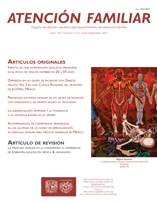Women’s Subordination and Tolerance for Based Gender Violence
Main Article Content
Abstract
Objective: to know how happens female subordination and their tolerance to violence based on gender, through the story of life of three women over the age of 35 who have experienced domestic violence, whose families were under treatment at the family therapy service of the Family Medicine Clinic “Gustavo A. Madero” of the Institute of Security and Social Services for the Workers of the State (ISSSTE) in Mexico City. Material and methods: a crosssectional, qualitative research design, not randomized and by fee, which allowed a two dimension analysis: 1. Individual (childhood, self-esteem, spouse choice and expectation of the relationship). 2. Social-familial (values, beliefs, religion, sexuality, gender and violence). Semi-structured interviews were made, which were analyzed through the theoretical and methodological tool of Christian Lalive d’Epinay; therefore it was made the typology, life cycle and description of the family structure. Results: this research argues that violence lived in the families, influences on the construction of gender, when conditioning a family structure with rigid limits, poor expression of affection, and rules that favored control, domination and subordination of women. The internalization of socio-cultural rules, according to the existing patriarchal organization establishes a hierarchical order which promotes the expression of domestic violence.
